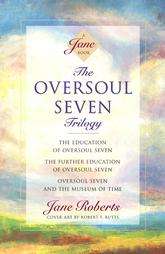The Oversoul Seven Trilogy
 First edition cover | |
| Author | Jane Roberts |
|---|---|
| Country | United States |
| Language | English |
| Genre | Novel |
| Publisher | Amber Allen |
Publication date | May 1, 1995 |
| Media type | Print (Paperback) |
| Pages | 560 pp |
| ISBN | 1-878424-17-3 |
| OCLC | 32013335 |
| 813/.54 20 | |
| LC Class | PS3568.O2387 O93 1995 |
The Oversoul Seven Trilogy is a novel by psychic author Jane Roberts. It consists of the three previously published books The Education of Oversoul Seven (1973), The Further Education of Oversoul Seven (1979), and Oversoul Seven and the Museum of Time (1984).[1]
The Oversoul Seven Trilogy is a work of fiction based on the Seth material. The Seth sessions are a series of trance communications Roberts dictated from 1963 to 1984, which provide an explanation from Seth (a multidimensional being Jane speaks for while in trance) on what it means to be human. For example: "The personality can dwell, and does dwell, in many worlds at once" (Seth, Session 180, page 212). The Oversoul Seven Trilogy is the culmination of Seth's teachings, distilled into a novelized format to explore his ideas on the nature of consciousness and reality creation.
At the end of book two, the consciousness which is Lydia goes through the process of rebirth to become the consciousness of Tweety. Despite being fascinated by the idea of becoming Tweety, Lydia begs her "Oversoul" (called Seven) for a teaching that Tweety will remember and be able to draw on and use in the "real world". Lydia does not wish to start from scratch and go through what she just experienced again. This time around she would like some guidelines. The result is the bedtime tale for Tweety found on pages 190-192. In this "tale" are found the concepts and purposes behind the novels.[2]
Editions
- Amber Allen ISBN 1-878424-17-3 Edition: Paperback; May 1, 1995[3]
See also
References
- ↑ "The Oversoul Seven Trilogy". Amber Allen. Retrieved 4 January 2009.
- ↑ Roberts, Jane. The Further Education of Oversoul Seven. pp. 190–2. ISBN 0-13-345306-5.
- ↑ "The Oversoul Seven Trilogy, Publisher: Amber Allen". ISBNdb entry. Retrieved 2009-01-04.